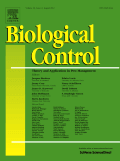
BIOLOGICAL CONTROL
Scope & Guideline
Transforming Agricultural Practices through Cutting-Edge Research
Introduction
Aims and Scopes
- Microbial Biocontrol Agents:
Research on bacteria, fungi, and other microorganisms as biocontrol agents, including their mechanisms of action, efficacy against specific pathogens, and their roles in enhancing plant defenses. - Insect and Arthropod Biocontrol:
Studies focusing on the use of predatory and parasitic insects for biological control of pest species, including investigations into their behavior, life history, and ecological interactions. - Ecological and Environmental Impacts:
Examination of the ecological implications of introducing biocontrol agents into new environments, including potential non-target effects and ecosystem dynamics. - Integrated Pest Management (IPM) Strategies:
Development and evaluation of integrated approaches combining biological control with other pest management tactics to enhance efficacy and sustainability. - Plant-Microbe Interactions:
Exploration of the interactions between plants and their associated microorganisms, particularly how these relationships can be harnessed for biocontrol purposes. - Weed Biocontrol:
Research on biological control methods for managing invasive plant species, including the identification and release of specific biocontrol agents.
Trending and Emerging
- Endophytic Microorganisms:
There is an increasing focus on the role of endophytic bacteria and fungi as biocontrol agents, particularly their ability to enhance plant resistance to pathogens and pests. - Genomic and Molecular Approaches:
Research utilizing genomic and transcriptomic analyses to understand the mechanisms of action of biocontrol agents is on the rise, providing deeper insights into their functionality. - Climate Change Adaptation:
Studies addressing the effects of climate change on the efficacy and behavior of biocontrol agents are gaining traction, emphasizing the need for adaptive management strategies. - Sustainable Agricultural Practices:
A growing trend towards integrating biological control within sustainable agricultural frameworks highlights the importance of ecological balance and reduced chemical inputs. - Microbial Consortia:
Research on the use of microbial consortia, where multiple species are combined for enhanced biocontrol efficacy, is increasingly popular, showcasing innovative approaches to pest management.
Declining or Waning
- Chemical Pest Control Comparisons:
Research comparing the efficacy of biological control methods with traditional chemical pesticides appears to be diminishing, as the focus shifts toward more sustainable practices and integrated approaches. - Generalist Predators in Agriculture:
While the role of generalist predators has historically been significant, recent publications indicate a decrease in studies specifically focusing on their effectiveness compared to targeted biocontrol agents. - Historical Case Studies:
The journal has seen a decline in the publication of retrospective analyses of past biological control programs, as newer research focuses more on current methodologies and innovations. - Niche-Specific Biocontrol Agents:
There seems to be a waning interest in niche-specific biocontrol agents, as broader, more integrative approaches are preferred in contemporary studies.
Similar Journals
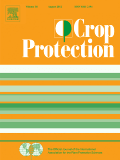
Crop Protection
Championing innovative practices in sustainable agriculture.Crop Protection is a leading academic journal in the field of Agronomy and Crop Science, published by Elsevier Science Ltd, and recognized for its high impact demonstrated by an impressive Q1 quartile ranking in 2023. With its ISSN 0261-2194 and E-ISSN 1873-6904, this esteemed publication has been a crucial source of research since its inception in 1982, continuing to provide valuable insights and advancements in crop protection strategies through 2024. The journal serves a diverse audience, including researchers, professionals, and students, eager to explore pioneering findings in pest management, herbicide development, and sustainable agricultural practices. While the journal does not offer open access options, its rigorous peer-review process ensures the highest quality of scholarly articles that contribute significantly to the agricultural and biological sciences, maintaining its respected position with a Scopus rank of #63 out of 406 in its category, placing it in the 84th percentile. Engaging with Crop Protection not only enriches knowledge but also promotes innovative solutions for global agricultural challenges.
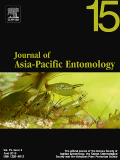
JOURNAL OF ASIA-PACIFIC ENTOMOLOGY
Advancing Insect Science Across the Asia-PacificJOURNAL OF ASIA-PACIFIC ENTOMOLOGY, published by the Korean Society of Applied Entomology, is a distinguished platform that fosters the advancement of knowledge in the field of entomology, specifically tailored to the Asia-Pacific region. Since its inception in 1998, this journal has been instrumental in providing critical insights into the diverse aspects of insect science, reflecting its commitment to supporting both research and application in a variety of contexts, including agriculture and environmental sustainability. The journal is categorized in the Q3 quartile for Insect Science according to the 2023 rankings, and it holds a respectable Scopus rank of #62 out of 181 in its niche, situating it within the top 66th percentile of its field. With a focus on peer-reviewed research that emphasizes innovation and practical applications, the journal serves as an essential resource for researchers, professionals, and students seeking to deepen their understanding of entomological studies and their implications across ecological and agricultural landscapes.
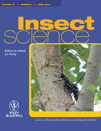
Insect Science
Exploring the intricate roles of insects in agriculture and ecology.Insect Science, published by WILEY, stands as a prestigious journal in the realms of Agronomy, Biochemistry, Genetics, and Insect Ecology. The journal, with ISSN 1672-9609 and E-ISSN 1744-7917, has firmly established itself as a significant resource for researchers and professionals seeking to explore the intricate dynamics of insects and their crucial roles in ecosystems. With a remarkable impact factor placing it in the Q1 quartile across multiple categories, including Ecology and Evolution and Agronomy and Crop Science, Insect Science ranks impressively at #8 out of 181 in the realm of Insect Science on Scopus, showcasing its influence and relevance in the field. Spanning its coverage from 1994 to 2024, this journal invites contributions that advance our understanding of insect biology, behavior, and their interactions within agricultural contexts. The commitment to high-quality research and its role in fostering interdisciplinary dialogue make Insect Science an essential platform for scholars and practitioners at the forefront of insect-related studies.

Persian Journal of Acarology
Advancing acarological knowledge for a sustainable future.The Persian Journal of Acarology, published by the Acariology Society of Iran, stands as a pivotal resource in the fields of Animal Science, Zoology, and Insect Science. Established in 2012 as an open-access platform, this journal provides researchers and academics with a rich repository of peer-reviewed articles focused on the study of acarology, encompassing both basic and applied research. With its current ranking in the Q3 category and significant Scopus rankings in related fields, the journal fosters scholarly communication among professionals, facilitating the advancement of acarology globally. The journal’s commitment to open access ensures that valuable research is available to a wide audience, supporting both emerging and established scientists in their pursuit of knowledge. With contributions from distinguished authors and a steady trajectory of growth, the Persian Journal of Acarology is a vital tool for those invested in the future of acarological studies and applied entomology.

Revista Caatinga
Bridging Knowledge in Agricultural and Biological SciencesRevista Caatinga is a premier open-access journal published by Universidade Federal Rural do Semi-Árido (UFERSA), dedicated to the dissemination of significant research within the field of Agricultural and Biological Sciences. Since its inception in 2006, the journal has aimed to bridge the knowledge gap in various aspects of agricultural practices and biological phenomena, making vital contributions to the scientific community. With its publications indexed in Scopus and holding an impressive Q2 categorization in the competitive landscape of agricultural sciences, the journal ranks within the top half of its category (100/221), demonstrating a commitment to quality scholarship. The journal is based in Brazil and covers a wide array of topics relevant to both local and global agricultural challenges. By fostering open access, Revista Caatinga ensures that vital research is available to a broad audience, promoting knowledge sharing and collaboration among researchers, practitioners, and students around the world.
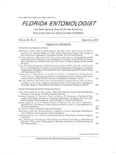
FLORIDA ENTOMOLOGIST
Pioneering Discoveries in Entomology and BeyondFLORIDA ENTOMOLOGIST is a prestigious peer-reviewed journal dedicated to the advancement of entomological sciences, published by Walter de Gruyter GmbH. Since its transition to open access in 1994, the journal has become a vital resource for researchers, students, and professionals in the fields of Insect Science and Ecology, Evolution, Behavior, and Systematics. With an impact factor ranking high in its category—Q2 in Insect Science and Q3 in Ecology, Evolution, Behavior and Systematics—the journal showcases significant findings and contributions that shape our understanding of insect biology and its implications for ecological systems. The journal is indexed in Scopus, further establishing its relevance, with current rankings reflecting its competitive standing within Agricultural and Biological Sciences. Published continuously since 1982, FLORIDA ENTOMOLOGIST not only facilitates the dissemination of knowledge among entomologists but also encourages interdisciplinary collaboration, making it an essential publication for anyone invested in the scientific study of insects.

Egyptian Journal of Biological Pest Control
Empowering ecological solutions for global pest control challenges.The Egyptian Journal of Biological Pest Control, published by SPRINGER, is a premier open-access journal dedicated to advancing the field of biological pest management. With its ISSN 1110-1768 and E-ISSN 2536-9342, this journal has established a reputation for disseminating high-quality research since its inception in 2008. Its commitment to open access since 2018 enhances its accessibility, making vital research available to a global audience. The journal boasts impressive Scopus rankings, including a Q1 classification in Agronomy and Crop Science and Insect Science for 2023, demonstrating its significant influence in the realms of ecological and agricultural research. The journal serves as an essential platform for researchers, professionals, and students interested in sustainable pest control strategies, focusing on the integration of biological methods within conventional agricultural practices. Based in Egypt, it plays a crucial role in addressing both regional and global challenges in pest management, affirming its importance in the scientific community.

PHYTOPARASITICA
Illuminating the Dynamics of Plant and Insect Relationships.PHYTOPARASITICA, published by SPRINGER in the Netherlands, is a distinguished journal dedicated to the fields of Insect Science and Plant Science. With an impressive convergence of research from 1973 to 2024, the journal holds a notable position in academic circles, ranking in Q2 for both categories as of 2023, according to Scopus metrics. This places PHYTOPARASITICA within the top 67th percentile for Insect Science and the 59th percentile for Plant Science, reflecting its significant impact on research and advancements in these crucial fields. The journal is committed to disseminating high-quality, peer-reviewed research that addresses the interplay between plants and their parasitic organisms, contributing to the broader understanding of agricultural sustainability and ecological balance. Researchers, professionals, and students will find this journal an essential resource for cutting-edge insights and developments within its domain.
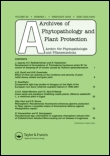
ARCHIVES OF PHYTOPATHOLOGY AND PLANT PROTECTION
Exploring the Frontiers of Agronomy and Crop ScienceArchives of Phytopathology and Plant Protection, published by Taylor & Francis Ltd, stands as a pivotal platform in the field of agronomy and crop science since its inception in 1974. With an ISSN of 0323-5408 and E-ISSN of 1477-2906, this journal is dedicated to publishing high-quality, peer-reviewed research that addresses contemporary challenges in plant pathology and protection. As a Q3 ranked journal in its category with Scopus Rank #210/406, it serves a vital role in disseminating practical solutions and innovative discoveries to enhance agricultural productivity and sustainability. The journal fosters a rich exchange of ideas among researchers, professionals, and students, empowering them to contribute to the advancement of the agronomy and biological sciences. Despite being traditionally subscription-based, the journal's commitment to comprehensive and rigorous research makes it an essential resource for anyone invested in the future of plant health and agricultural innovation.
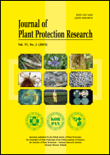
JOURNAL OF PLANT PROTECTION RESEARCH
Exploring the forefront of pest management and plant protection.JOURNAL OF PLANT PROTECTION RESEARCH is a pivotal publication in the realm of agricultural sciences, dedicated to advancing our understanding of plant protection and pest management. Published by the INST OCHRONY ROSLIN, PANSTWOWY INST BADAWCZY in Poland, this journal has been an open-access venue since 2008, ensuring that research findings are readily accessible to a global audience. With an ISSN of 1427-4345 and E-ISSN of 1899-007X, it serves as a crucial platform for scholars and practitioners in the fields of Agronomy, Plant Science, and Soil Science. In the latest categorizations, it has achieved a Q3 ranking in these disciplines, reflecting its impact and significance within the scientific community. As the journal converges its scope from 2008 to 2024, it continues to address pressing issues in plant health and sustainability. Its strategic placement within the Scopus ranks offers valuable insights into agricultural and biological sciences, making it an essential read for those seeking to enhance their expertise in plant protection strategies.